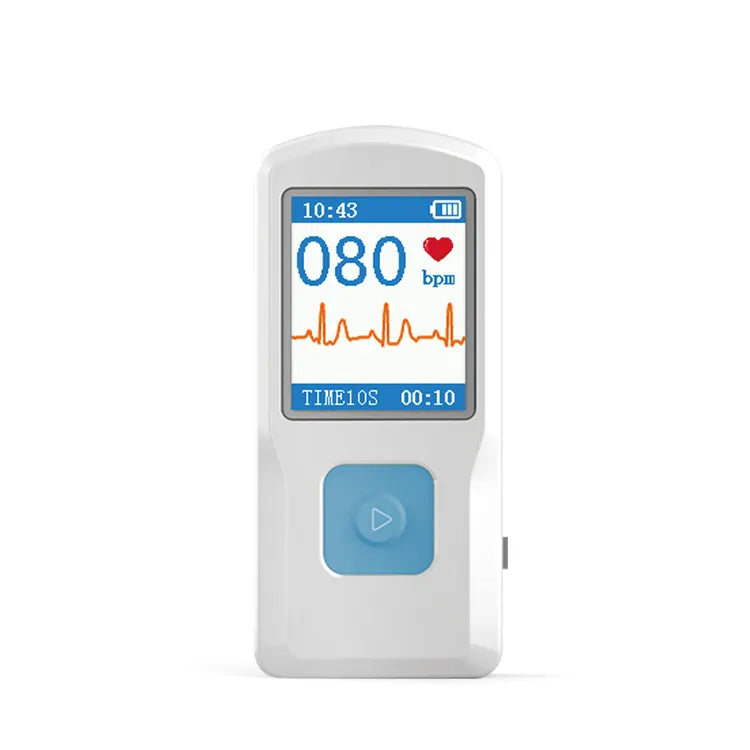The Ultimate Guide to Choosing and Using a Digital Pregnancy Test with Weeks Tracking
Are you looking for a foolproof way to track your pregnancy with accuracy and ease? Look no further than the digital pregnancy tests with weeks tracking. This ultimate guide will walk you through everything you need to know about choosing and using a digital pregnancy test that not only tells you if you're pregnant but also provides an estimate of how many weeks along you are.
In this guide, we'll explore the different types of digital pregnancy tests available, their features, and how to make an informed decision when purchasing one. We'll also delve into the advantages of weeks tracking and why it can be a valuable tool during your pregnancy journey.
With step-by-step instructions on how to properly use a digital pregnancy test, we'll ensure that you get accurate results every time. Plus, we'll address common questions and concerns about digital pregnancy tests, ensuring that you're fully informed and confident in your choice.
Don't leave your pregnancy journey to chance – equip yourself with the knowledge and tools to track your progress with precision. Let's dive into the ultimate guide to choosing and using a digital pregnancy test with weeks tracking.
How do digital pregnancy tests with weeks tracking work?
Digital pregnancy tests with weeks tracking work by detecting the presence of the pregnancy hormone, human chorionic gonadotropin (hCG), in your urine. When you're pregnant, your body starts producing hCG, and this hormone is what a digital pregnancy test with weeks tracking detects.
Unlike traditional pregnancy tests that simply provide a positive or negative result, digital pregnancy tests with weeks tracking go a step further. They not only confirm whether you're pregnant or not but also estimate how many weeks along you are. This added feature is particularly beneficial for women who want to track their pregnancy progress with precision.
Digital pregnancy tests with weeks tracking typically have a small screen that displays your results.Some models even have a backlight for easy reading. Upon taking the test, the screen will show a symbol (such as a plus sign or the word "pregnant") to indicate a positive result. Additionally, it will display the number of weeks since conception or the estimated gestational age.
Benefits of using a digital pregnancy test with weeks tracking
Using a digital pregnancy test with weeks tracking offers several advantages over traditional pregnancy tests. First and foremost, it provides a clear and easy-to-read result. With a digital display, there's no need to interpret faint lines or worry about misreading the results. The digital screen eliminates any confusion, giving you a definitive answer.

Another benefit is the weeks tracking feature.By knowing approximately how many weeks you are into your pregnancy, you can better plan and prepare for the journey ahead. It allows you to track your progress and milestones, making it an invaluable tool for expectant mothers. Plus, it gives you a sense of reassurance and confidence as you navigate through each stage of your pregnancy.
Digital pregnancy tests with weeks tracking are also highly accurate. They have been extensively tested and proven to deliver reliable results. This reliability can greatly reduce anxiety and uncertainty during the early stages of pregnancy, providing peace of mind for women eager to know if they're expecting.
Factors to consider when choosing a digital pregnancy test with weeks tracking
When choosing a digital pregnancy test with weeks tracking, there are several key factors to consider. First, you'll want to look for a reputable brand. Stick to well-known and established manufacturers that have a proven track record of producing reliable and accurate tests. Reading customer reviews and consulting with healthcare professionals can also provide valuable insights.
Next, consider the features offered by different models. Some digital pregnancy tests with weeks tracking have additional features such as a countdown timer or the ability to save and track multiple test results. Determine which features are important to you and align with your needs and preferences.
Price is another important factor to consider. While digital pregnancy tests with weeks tracking tend to be slightly more expensive than traditional tests, they offer added benefits and convenience. Consider your budget and weigh the value you'll receive from the additional features before making a decision.
Lastly, ensure that the digital pregnancy test you choose is easy to use. Look for a test with clear instructions and a user-friendly design. The last thing you want is to struggle with a complicated test during a time when you're already feeling anxious or overwhelmed.
Understanding the accuracy of digital pregnancy tests with weeks tracking

One common concern among women considering a digital pregnancy test with weeks tracking is its accuracy. Rest assured, these tests are highly accurate when used correctly. In fact, digital pregnancy tests with weeks tracking have been shown to be more than 99% accurate in detecting pregnancy.
To ensure accurate results, it's important to follow the instructions provided with the test carefully. Take the test at the appropriate time, usually a few days after you miss your period. This will give your body enough time to produce sufficient levels of hCG for the test to detect.
It's also worth noting that the accuracy of the weeks tracking feature may vary slightly. The estimated gestational age provided by the test is based on average hCG levels, and individual variations in hormone levels may affect the accuracy.
However, for most women, the estimate will be within a reasonable range.
Step-by-step guide on using a digital pregnancy test with weeks tracking
Using a digital pregnancy test with weeks tracking is simple and straightforward. Follow these step-by-step instructions to ensure accurate results:
1. Read the instructions provided with the test carefully. Familiarize yourself with the features of the specific brand and model you're using.
2. Collect a urine sample in a clean cup. Make sure it's a sufficient amount to submerge the test's absorbent tip.
3. Remove the test from its packaging, taking care not to touch the absorbent tip.
4. Dip the absorbent tip into the urine sample for the specified amount of time.
Alternatively, some tests allow you to hold the absorbent tip directly in your urine stream.
5. Place the test on a flat surface with the digital screen facing up. Wait for the designated amount of time for the results to appear.
6. Once the results are displayed, read them carefully. Look for the symbol indicating a positive result and the number of weeks since conception or estimated gestational age.
7. Dispose of the test according to the manufacturer's instructions.
Remember to take the test at the appropriate time, ideally a few days after you miss your period, for the most accurate results.
Interpreting the results of a digital pregnancy test with weeks tracking
Interpreting the results of a digital pregnancy test with weeks tracking is straightforward. If the test displays a symbol, such as a plus sign or the word "pregnant," it indicates a positive result. Congratulations, you're pregnant!
The number of weeks since conception or the estimated gestational age will also be displayed on the screen. Keep in mind that this estimate is based on average hCG levels and may vary slightly for different women. It's a general guideline to help you track your pregnancy progress.
If the test displays a negative result, it means that hCG was not detected in your urine. However, if you believe you may still be pregnant despite the negative result, it's advisable to consult with your healthcare provider for further testing or guidance.
Common misconceptions about digital pregnancy tests with weeks tracking
There are several common misconceptions about digital pregnancy tests with weeks tracking. One of the most prevalent is that these tests are more expensive than traditional tests. While it's true that digital pregnancy tests with weeks tracking generally cost a bit more, the added features and accuracy they offer make them a worthwhile investment for many women.
Another misconception is that digital pregnancy tests with weeks tracking are more complicated to use. In reality, they are just as simple as traditional tests, if not easier. The digital display eliminates any ambiguity and provides clear results, making it a user-friendly option for women of all ages.
Some women also worry that the weeks tracking feature may be inaccurate or unreliable. While it's true that individual variations in hormone levels may affect the accuracy of the estimated gestational age, the overall reliability of digital pregnancy tests with weeks tracking has been proven through extensive testing and research.
Tips for maximizing the effectiveness of a digital pregnancy test with weeks tracking

To maximize the effectiveness of a digital pregnancy test with weeks tracking, consider the following tips:
1. Take the test at the appropriate time, ideally a few days after you miss your period. This will give your body enough time to produce sufficient levels of hCG for accurate detection.
2. Follow the instructions provided with the test carefully. Ensure that you're using the test correctly and that you understand its features and limitations.
3. Store the test in a cool, dry place and check the expiration date before using it.
Expired tests may not provide accurate results.
4. If you're unsure about the results or have any concerns, consult with your healthcare provider. They can offer guidance and perform further testing if necessary.
5. Use the weeks tracking feature as a general guideline for tracking your pregnancy progress. Remember that individual variations in hormone levels may affect the accuracy of the estimated gestational age.
6. Consider keeping a record of your test results and the estimated gestational age provided by the test. This will allow you to track your progress and milestones throughout your pregnancy.
Conclusion
Choosing and using a digital pregnancy test with weeks tracking can provide you with accurate and valuable information during your pregnancy journey. From confirming your pregnancy to estimating your gestational age, these tests offer convenience, reliability, and peace of mind.
By understanding how digital pregnancy tests with weeks tracking work, considering important factors when choosing one, and following the step-by-step instructions for use, you can ensure accurate results every time. Remember to interpret the results correctly and address any misconceptions or concerns you may have.
Equipped with the knowledge and tools provided in this ultimate guide, you can confidently embark on your pregnancy journey, knowing that you have a reliable and precise way to track your progress. Don't leave your pregnancy to chance – embrace the benefits of a digital pregnancy test with weeks tracking and enjoy a smoother, more informed experience.
Related Articles
The Promising of Cholesterol Testing
What Advantages Of A Portable Mesh Nebulizer?
Hemoglobin Meter: Let's help people to monitor anemia
How to choose a better digital thermometer
Digital Pregnancy Test : Assisting Couples in Conceiving
Portable Fetal Doppler: Bonding with Your Baby
Budget-Friendly Pregnancy Testing: How Reusing Digital Pregnancy Tests Can Help You Save
Reference
Pike J, Godbert S, Johnson S. Comparison of volunteers' experience of using, and accuracy of reading, different types of home pregnancy test formats. Expert Opinion on Medical Diagnostics 2013;7(5):435-44
WE RECOMMEND
Related posts
- Subscribe MedInsights
- Subscribe MedInsights
- Subscribe MedInsights
- Subscribe MedInsights
- Subscribe MedInsights










